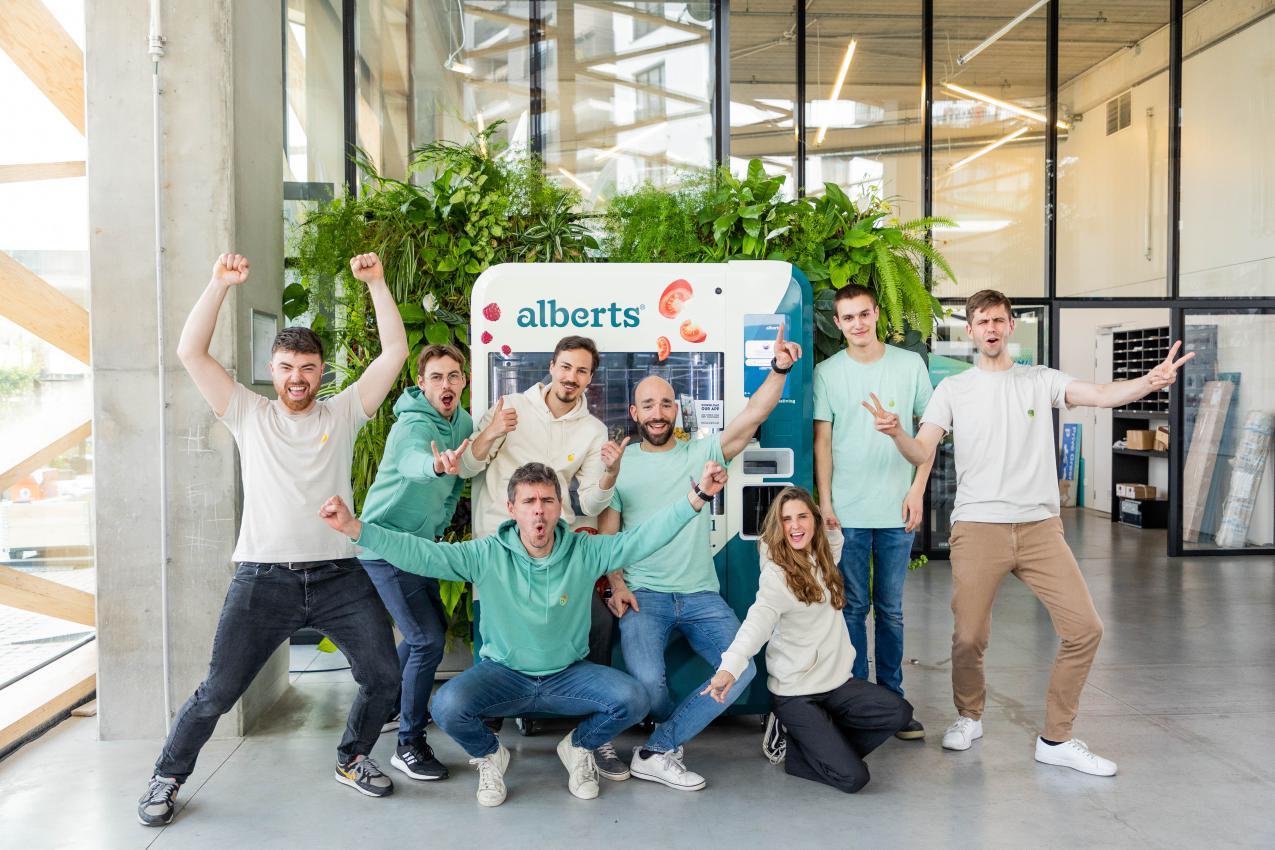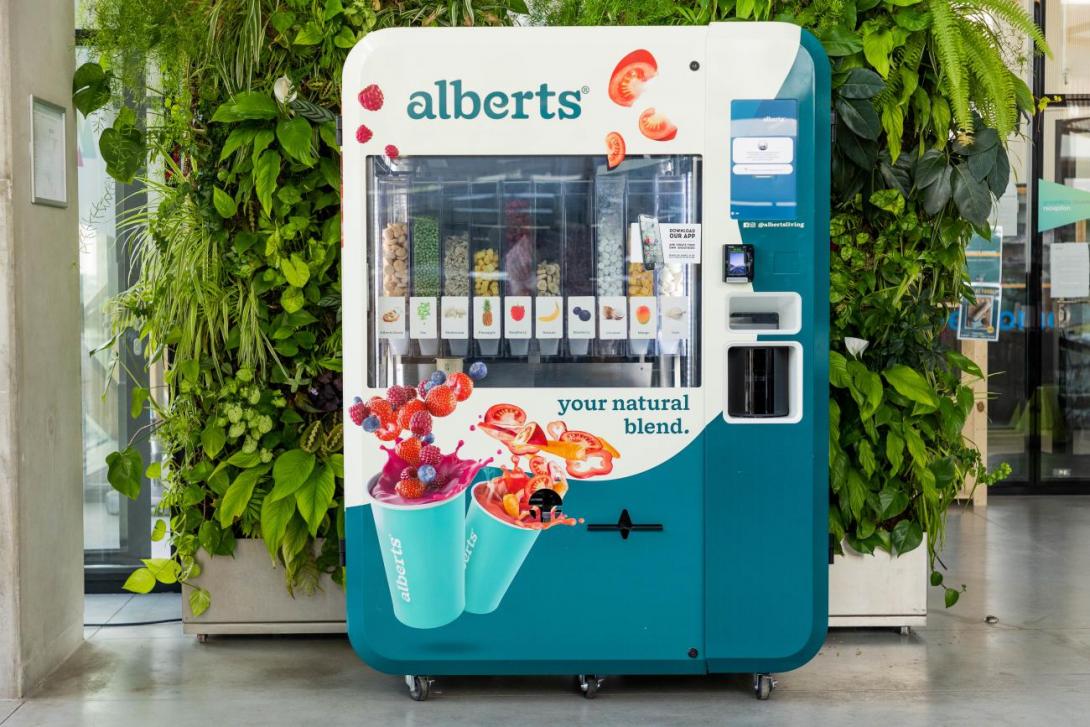Startup Alberts has developed the world's first-ever smoothie machine that makes your favorite smoothie, soup or vegan shake from fresh fruits and vegetables at the touch of a button. But how do you ensure that the risk of contamination of your smoothie is as minimal as possible? For Alberts one of the reasons to participate in research into the development of a biosensor with which food products can be tested - cheaply and quickly - for possible bacterial contamination during the production process.
Food safety is a hot topic. Which also makes the link to one of the main themes of Brightlands Campus Greenport Venlo. Nothing is as sensitive as our daily food. All the more reason, therefore, to minimize the risks and to detect possible contamination in food as quickly as possible. Companies like Alberts now send samples for this purpose to specialized laboratories at set times. But this is a time-consuming and expensive method: it can take up to a week before the results are known. The possibility cannot be ruled out that certain contaminants will not be detected in time, which will increase the risk of a recall. The result is damage to the company's image and economic loss.
Biosensor
The demand for a system that can already detect bacteria during the production process is high. Maastricht University, KU Leuven and Hasselt University have developed a sensor technology that can do this. In the agrEUfood innovation project, Dutch and Belgian researchers and companies are working together with Brightlands Campus Greenport Venlo on a biosensor that uses a synthetic recognition layer (receptor) to detect, in this case, a bacterium. By integrating this sensor into a machine in which a fresh product is made, any contamination can be quickly detected and resolved.
Bacteria
Bacteria
According to Kasper Eersels, assistant professor of Sensor Engineering at Maastricht University, this biosensor makes it possible to know within two to three hours whether your product is free of bacteria. The sensor must of course know which bacteria to detect. In this project the focus is on the E-coli bacterium. But once we have this biosensor working, we can switch to other applications. The type of bacteria you detect can be adjusted. In concrete terms that means that in the future you can also use this technology in horticulture to detect bacteria in vegetables and fruit, for example.'
Smoothierobot
A laboratory version of the biosensor has now been created and is being tested at companies including Alberts in Wijnegem, Belgium, near Antwerp. This startup has developed the world's very first smoothie machine that makes personalized, fresh smoothies based on pure fruit, vegetables and water. With this machine, founders Glenn Mathijssen and Stefan Maas want to make it easy for users to choose healthier foods and develop better eating habits. There are now more than ten machines in Belgium and about thirty are still in production. Besides machines for smoothies, there are also vending machines available for hot soups and vegan snacks.
Health
Health
Health is the main driver for the startup in everything they do, explains Glenn Mathijssen: 'Fruit and vegetables are good for humans, but we only eat 9% of the daily recommended amount of fruit. With vegetables, that percentage is even lower, at 3%. Eating an apple, an orange or a spinach leaf is not sexy or convenient enough, so we went in search of a solution where we could - literally - put healthy food in someone's mouth. With the blends our machine makes, fully customized to your taste profile, we make it easy and fun to eat healthier.'
Extra layer of security
The smoothie maker is filled with frozen fruits and vegetables, ensuring freshness - and therefore vitamins and minerals. You put together your own smoothie via an app or choose between 6 preset smoothies with fresh fruits and/or vegetables. Once the choice is made, you can see live how the smoothie is made. The machine is completely self-cleaning, so there is no risk of contamination.
But because it works with fresh products, Glenn says the risk is a bit higher than, for example, products that have been pasteurized. We want to build an extra layer of security into our machine with this biosensor. You measure on the spot whether your product is free of bacteria. If something is wrong, the machine stops automatically. As an entrepreneur you can watch in real time and - if necessary - intervene immediately. Another advantage of this sensor is that we can also find out better where the problem started and take action on it.
Cleaning water
The biosensor is not yet literally in a working machine of Alberts. We are now first testing it in the cleaning water of our machine. The first results are very good: the sensor does what it is supposed to do and detects bacteria. Only these bacteria are completely harmless and cause no problems. So now we have to go back to the drawing board to find out why the sensor gives this so-called 'false positive': a result that is wrongly positive. We will certainly continue the research on the biosensor.'
The first tests also provide nice insights into the operation of the machine, according to Glenn. 'In all tests no E-coli bacteria were found. We are very happy with that because this is the bacteria that causes the most problems. This means that the self-cleaning mechanism of our machine works perfectly. Our dream of making the world a little healthier with these machines is becoming more realistic every day. I can see a future where our healthy vending machine is standard next to the soft drink and snack machine in schools, hospitals and sports clubs!'

Brightlands
Within the project, Maastricht University, KULeuven and Hasselt University are collaborating with Alberts, Dürüm Company NL Voxdale BVBA and Yookr. In addition, Brightlands Campus Greenport Venlo and the Flemish Institute for Agricultural, Fisheries and Food Research (ILVO) are also involved in the project.
Brightlands has brought together all the Dutch parties within the project and ensures that the knowledge from the project becomes available to everyone. This cooperation is important according to Glenn: 'All parties in this project bring their own knowledge and expertise. By bringing together all these different disciplines, from research to software, you make smart use of each other's knowledge. This allows you to quickly achieve concrete results that really help you as a company.'
